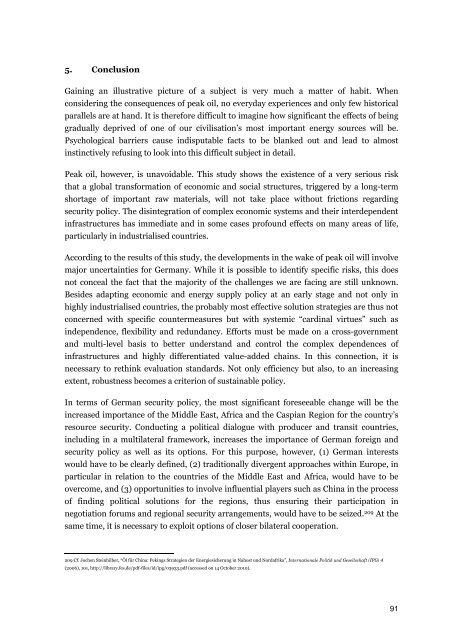PEAK OIL
PEAK OIL
PEAK OIL
You also want an ePaper? Increase the reach of your titles
YUMPU automatically turns print PDFs into web optimized ePapers that Google loves.
5. Conclusion<br />
Gaining an illustrative picture of a subject is very much a matter of habit. When<br />
considering the consequences of peak oil, no everyday experiences and only few historical<br />
parallels are at hand. It is therefore difficult to imagine how significant the effects of being<br />
gradually deprived of one of our civilisation’s most important energy sources will be.<br />
Psychological barriers cause indisputable facts to be blanked out and lead to almost<br />
instinctively refusing to look into this difficult subject in detail.<br />
Peak oil, however, is unavoidable. This study shows the existence of a very serious risk<br />
that a global transformation of economic and social structures, triggered by a long-term<br />
shortage of important raw materials, will not take place without frictions regarding<br />
security policy. The disintegration of complex economic systems and their interdependent<br />
infrastructures has immediate and in some cases profound effects on many areas of life,<br />
particularly in industrialised countries.<br />
According to the results of this study, the developments in the wake of peak oil will involve<br />
major uncertainties for Germany. While it is possible to identify specific risks, this does<br />
not conceal the fact that the majority of the challenges we are facing are still unknown.<br />
Besides adapting economic and energy supply policy at an early stage and not only in<br />
highly industrialised countries, the probably most effective solution strategies are thus not<br />
concerned with specific countermeasures but with systemic “cardinal virtues” such as<br />
independence, flexibility and redundancy. Efforts must be made on a cross-government<br />
and multi-level basis to better understand and control the complex dependences of<br />
infrastructures and highly differentiated value-added chains. In this connection, it is<br />
necessary to rethink evaluation standards. Not only efficiency but also, to an increasing<br />
extent, robustness becomes a criterion of sustainable policy.<br />
In terms of German security policy, the most significant foreseeable change will be the<br />
increased importance of the Middle East, Africa and the Caspian Region for the country’s<br />
resource security. Conducting a political dialogue with producer and transit countries,<br />
including in a multilateral framework, increases the importance of German foreign and<br />
security policy as well as its options. For this purpose, however, (1) German interests<br />
would have to be clearly defined, (2) traditionally divergent approaches within Europe, in<br />
particular in relation to the countries of the Middle East and Africa, would have to be<br />
overcome, and (3) opportunities to involve influential players such as China in the process<br />
of finding political solutions for the regions, thus ensuring their participation in<br />
negotiation forums and regional security arrangements, would have to be seized. 209 At the<br />
same time, it is necessary to exploit options of closer bilateral cooperation.<br />
209 Cf. Jochen Steinhilber, “Öl für China: Pekings Strategien der Energiesicherung in Nahost und Nordafrika”, Internationale Politik und Gesellschaft (IPG) 4<br />
(2006), 101, http://library.fes.de/pdf-files/id/ipg/03933.pdf (accessed on 14 October 2010).<br />
91


